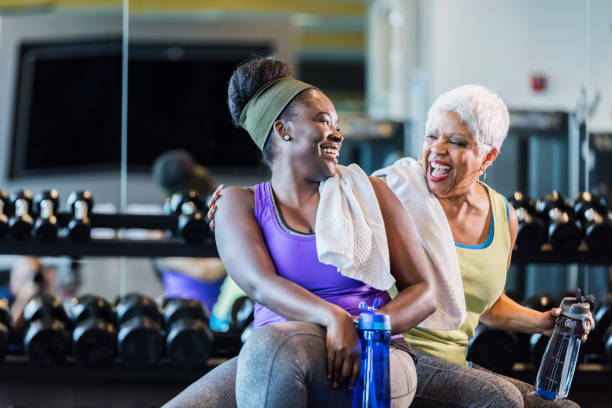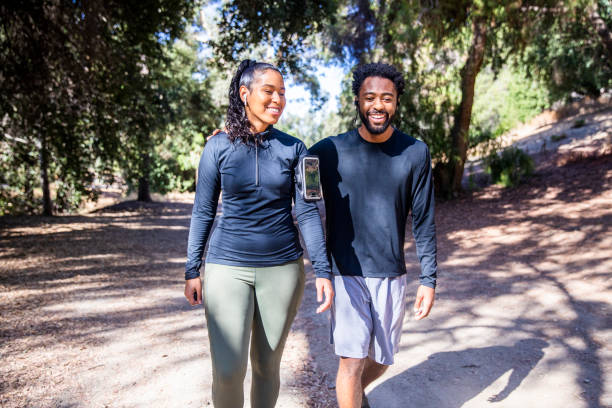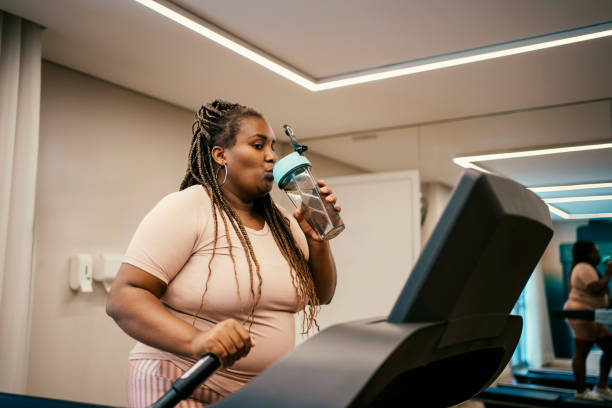(BlackFitness101.com) Fueling your body properly is just as important as the workout itself when it comes to achieving fitness goals. Whether you’re aiming to build muscle, increase endurance, lose fat, or simply stay healthy, what you eat before and after a workout can significantly impact your performance and recovery. As a fitness trainer, I’ve seen how poor nutrition can lead to subpar results, and on the other hand, how the right nutrition can supercharge progress. In this article, we will go in-depth into what to eat before and after your workout to maximize the benefits and help you reach your fitness goals.

Why Nutrition Matters in Your Workout Routine
To understand the importance of pre- and post-workout nutrition, you need to grasp how your body uses fuel. Your body relies primarily on glycogen (stored carbohydrates) for energy during high-intensity workouts. Protein, fats, and carbohydrates all play crucial roles in muscle recovery, energy production, and endurance. Your body also needs these nutrients to repair tissues and adapt to the stress of physical activity.
Pre-workout nutrition ensures that you have the energy to sustain your workout and push through challenging exercises. Post-workout nutrition is all about helping your body recover, rebuild, and come back stronger for your next session. Without the right foods, your workout performance and recovery can suffer, which may delay your progress.
What to Eat Before a Workout
Pre-workout meals should focus on providing your body with the right nutrients to fuel your muscles and prevent fatigue. A proper pre-workout meal improves endurance, enhances muscle strength, and increases overall performance.
1. Carbohydrates: Your Main Fuel Source
Carbohydrates are the body’s preferred energy source, especially for high-intensity exercises. Before working out, aim for complex carbohydrates that break down slowly, providing a steady stream of energy throughout your session.
Good Pre-Workout Carbohydrate Options:
- Whole grains (oats, brown rice, quinoa)
- Sweet potatoes
- Whole grain bread or pasta
- Fruit (bananas, berries, apples)
- Vegetables (broccoli, spinach, kale)
These foods provide sustained energy, keeping your blood sugar stable and preventing early fatigue. If you’re engaging in intense training, such as HIIT (High-Intensity Interval Training) or heavy weightlifting, eating a combination of complex carbs and simple carbs (like fruit) can give you an additional energy boost.
2. Protein: Supporting Muscle Performance
Protein is crucial for muscle repair, growth, and maintenance. A pre-workout snack or meal that contains protein can help reduce muscle breakdown during exercise and provide essential amino acids for muscle recovery after your workout.
Good Pre-Workout Protein Sources:
- Chicken or turkey breast
- Greek yogurt
- Eggs or egg whites
- Cottage cheese
- Plant-based protein sources (tofu, tempeh, lentils, chickpeas)
Pairing protein with carbs ensures that your muscles have a readily available source of amino acids while also giving you energy to power through your workout.
3. Fats: A Secondary Energy Source
Although fats are not as quickly accessible as carbohydrates, they can still provide energy, especially during lower-intensity workouts or endurance activities like long-distance running or cycling. It’s important not to go overboard with fats before a workout, as they take longer to digest and could make you feel sluggish.
Good Pre-Workout Fat Sources:
- Avocados
- Nuts and seeds (almonds, chia seeds, flaxseeds)
- Nut butters (peanut butter, almond butter)
- Olive oil
- Fatty fish (salmon)
If you’re doing a longer, less intense workout, incorporating healthy fats can provide a steady energy supply without spiking your blood sugar.
4. Timing Your Pre-Workout Meal
The timing of your pre-workout meal can have a significant impact on your performance. Eating too much right before a workout can lead to discomfort, cramping, or nausea. On the other hand, working out on an empty stomach can leave you feeling weak or light-headed.
Here’s a general guideline for timing:
- Large meals (500-700 calories): Eat 3-4 hours before your workout.
- Smaller meals (300-500 calories): Eat 2-3 hours before your workout.
- Snacks (100-200 calories): Eat 30 minutes to an hour before your workout.
If you’re short on time, a quick snack consisting of easily digestible carbs and protein (like a banana with peanut butter or a smoothie) can give you an energy boost without weighing you down.
What to Eat After a Workout
After your workout, your body is in recovery mode. Your muscles are primed for growth and repair, and your glycogen stores are depleted. Post-workout nutrition is all about replenishing glycogen, repairing muscle tissue, and reducing muscle soreness and fatigue.
1. Carbohydrates: Replenishing Glycogen Stores
During your workout, especially if it’s intense or long in duration, your body uses glycogen as its primary energy source. After your workout, it’s important to replenish these glycogen stores to prevent fatigue and prepare your body for the next workout.
Good Post-Workout Carbohydrate Sources:
- Brown rice
- Sweet potatoes
- Quinoa
- Whole wheat pasta or bread
- Fruit (bananas, berries, oranges)
- Vegetables (carrots, beets, squash)
The best time to consume carbs is within 30-60 minutes post-exercise when your muscles are most receptive to glycogen replenishment. Pairing carbs with protein will enhance muscle recovery.
2. Protein: Essential for Muscle Recovery
Protein is even more crucial after a workout. Exercise creates tiny tears in your muscle fibers, and protein provides the amino acids necessary to repair and rebuild these tissues. For optimal muscle recovery, aim to consume at least 20-40 grams of protein within an hour of your workout.
Good Post-Workout Protein Sources:
- Lean meats (chicken, turkey)
- Fish (salmon, tuna)
- Eggs
- Greek yogurt
- Protein shakes (whey or plant-based protein)
- Cottage cheese
A balanced meal of carbohydrates and protein can help optimize your body’s recovery process and build muscle more efficiently.
3. Fats: Supporting Overall Recovery
While fats are not as crucial immediately after a workout as carbohydrates and protein, they do play a role in overall recovery and help reduce inflammation. Including healthy fats in your post-workout meal can aid in muscle recovery and provide sustained energy.
Good Post-Workout Fat Sources:
- Nuts and seeds
- Fatty fish (salmon, mackerel)
- Avocados
- Olive oil
Avoid overloading your post-workout meal with fat, as it may slow down the digestion of protein and carbohydrates. A small amount is sufficient to support recovery without interfering with your body’s ability to absorb the nutrients it needs.
4. Hydration: Replenishing Lost Fluids
One often overlooked aspect of post-workout recovery is hydration. During exercise, your body loses water and electrolytes through sweat. Failing to replace these fluids can lead to dehydration, muscle cramps, and even diminished performance in future workouts.
After your workout, aim to drink 16-24 ounces of water for every pound of body weight lost during exercise. Additionally, if you’ve engaged in a particularly intense or prolonged workout, consider replenishing electrolytes by consuming a sports drink, coconut water, or foods rich in electrolytes like bananas, spinach, and nuts.
Pre- and Post-Workout Meal Ideas
Now that you understand the importance of nutrition before and after your workout, let’s put that knowledge into action with some practical meal ideas.
Pre-Workout Meal Ideas
- Oatmeal with Fruit and Almonds: A perfect blend of complex carbs, healthy fats, and protein.
- Whole Grain Toast with Peanut Butter and Banana: Simple, quick, and packed with energy.
- Greek Yogurt with Berries and Honey: High in protein and antioxidants to fuel your workout.
- Brown Rice and Chicken: A balanced meal for those training sessions that require sustained energy.
- Smoothie with Protein Powder, Spinach, Banana, and Almond Butter: A light yet nutrient-packed option if you’re short on time.
Post-Workout Meal Ideas
- Grilled Salmon with Sweet Potatoes and Steamed Vegetables: Rich in protein, healthy fats, and complex carbs for muscle recovery.
- Chicken Breast with Quinoa and Roasted Veggies: A balanced meal that covers all your post-workout needs.
- Protein Shake with a Banana and Almond Butter: Quick, easy, and ideal for those on the go.
- Egg White Omelet with Spinach, Avocado, and Whole Wheat Toast: A high-protein, nutrient-dense meal that aids recovery.
- Greek Yogurt with Honey, Chia Seeds, and Fresh Fruit: Light but packed with protein, carbs, and healthy fats.
Special Considerations Based on Workout Type
Different types of workouts may require slight variations in pre- and post-workout nutrition.
Strength Training:
For weightlifting and muscle-building exercises, prioritize protein both before and after your workout. Your body needs ample protein to repair and build muscle tissues, and combining it with carbohydrates will help refuel your muscles and support recovery.
Endurance Training:
For long-distance running, cycling, or swimming, carbohydrates should be your main focus before and after your workout. These activities deplete glycogen stores more quickly, so make sure to replenish them after your workout to avoid fatigue.
HIIT (High-Intensity Interval Training):
HIIT workouts burn a significant amount of energy in a short time. Focus on consuming quick-digesting carbohydrates before your workout to ensure you have the energy to sustain high-intensity efforts. After your workout, prioritize both protein and carbs to aid recovery and muscle repair.
Food is Fuel
Nutrition is a key component of any successful fitness routine. By fueling your body with the right nutrients before and after your workout, you can enhance performance, speed up recovery, and ultimately achieve better results. Tailor your meals based on the type of workout, the intensity, and your personal fitness goals. Remember, consistency in both your training and your nutrition is the key to long-term success.
Eating the right foods at the right times doesn’t have to be complicated. Focus on whole, nutrient-dense foods that provide a balance of carbohydrates, protein, and healthy fats. By doing so, you’re giving your body the best chance to perform at its peak and recover efficiently, ensuring that you continue to make progress and hit your fitness goals.
Staff Writer; Janet Banks
Questions? Feel free to email me at; JBanks@BlackFitness101.com.












Leave a Reply